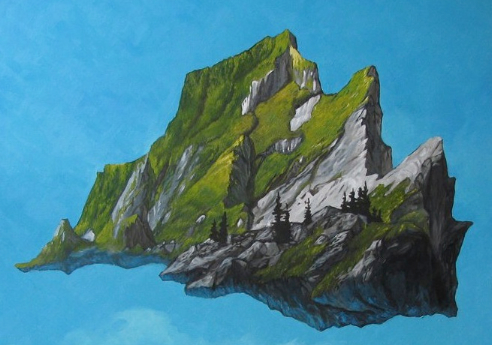Book Excerpt: 3 Sections by Vijay Seshadri
Imaginary Number

Painting by Anton Zanesco
The mountain that remains when the universe is destroyed
is not big and is not small.
Big and small are
comparative categories, and to what
could the mountain that remains when the universe is destroyed
be compared?
Consciousness observes and is appeased.
The soul scrambles across the screes.
The soul,
like the square root of minus 1,
is an impossibility that has its uses.
Three Urdu Poems
1. Mirza Ghalib
No, I wasn’t meant to love and be loved.
If I’d lived longer, I would have waited longer.
Knowing you are faithless keeps me alive and hungry.
Knowing you faithful would kill me with joy.
Delicate are you, and your vows are delicate, too,
so easily do they break.
You are a laconic marksman. You leave me
not dead but perpetually dying.
I want my friends to heal me, succor me.
Instead, I get analysis.
Conflagrations that would make stones drip blood
are campfires compared to my anguish.
Two-headed, inescapable anguish!—
Love’s anguish or the anguish of time.
Another dark, severing, incommunicable night.
Death would be fine, if I only died once.
I would have liked a solitary death,
not this lavish funeral, this grave anyone can visit.
You are mystical, Ghalib, and, also, you speak beautifully.
Are you a saint, or just drunk as usual?
2. Momin Khan Momin
My cause doesn’t affect her, and, even worse,
the pain I feel doesn’t cause pleasure.
I’m not that far gone. I still prefer
hearing she betrays me to her betraying me.
The very cosmos is thwarted because
in none of the ways you could be mine are you mine.
I don’t know why she still keeps my heart,
as useless to her as an unpaired sandal.
Fate abhors me and I abhor fate,
and prayer can’t reconcile us.
It’s as if you’re with me when I’m alone.
It’s as if I’m alone when you’re with me.
Momin, you’re really a piece of work.
Is she God that you should kiss the hem of her garment?
3. Mirza Ghalib
How few, how paltry few, of all the beautiful apparitions pulverized to earth
were resurrected as a tulip or a rose.
How many of my glittering memories of the feast of love
were warehoused in oblivion.
The stars, bashful behind the veil of day,
what possesses them to become scandalous by night?
The father pining for the child sold to Pharaoh,
his eyes have become the windows of the walls that immure him.
I’m sorry, but I’m not like that woman who loved those who loved
whom she loved. The opposite, in fact.
The night is his who spends it coiled with you.
O citizens, if Ghalib keeps weeping like this,
his tears will sweep your cities away.
Trailing Clouds of Glory
Even though I’m an immigrant,
the angel with the flaming sword seems fine with me.
He unhooks the velvet rope. He ushers me into the club.
Some activity in the mosh pit, a banquet here, a panhandler there,
a gray curtain drawn down over the infinitely curving lunette,
Jupiter in its crescent phase, huge,
a vista of a waterfall, with a rainbow in the spray,
a few desultory orgies, a billboard
of the snub-nosed electric car of the future—
the inside is exactly the same as the outside,
down to the m.c. in the yellow spats.
So why the angel with the flaming sword
bringing in the sheep and waving away the goats,
and the men with the binoculars,
elbows resting on the roll bars of jeeps,
peering into the desert? There is a border,
but it is not fixed, it wavers, it shimmies, it rises
and plunges into the unimaginable seventh dimension
before erupting in a field of Dakota corn. On the F train
to Manhattan yesterday, I sat across
from a family threesome Guatemalan by the look of them—
delicate and archaic and Mayan—
and obviously undocumented to the bone.
They didn’t seem anxious. The mother was
laughing and squabbling with the daughter
over a knockoff smart phone on which they were playing a
video game together. The boy, maybe three,
disdained their ruckus. I recognized the scowl on his face,
the retrospective, maskless rage of inception.
He looked just like my son when my son came out of his mother
after thirty hours of labor—the head squashed,
the lips swollen, the skin empurpled and hideous
with blood and afterbirth. Out of the inflamed tunnel
and into the cold room of harsh sounds.
He looked right at me with his bleared eyes.
He had a voice like Richard Burton’s.
He had an impressive command of the major English texts.
I will do such things, what they are yet I know not,
but they shall be the terrors of the earth, he said.
The child, he said, is father of the man.
Memoir
Orwell says somewhere that no one ever writes the real story of their life.
The real story of a life is the story of its humiliations.
If I wrote that story now—
radioactive to the end of time—
people, I swear, your eyes would fall out, you couldn’t peel
the gloves fast enough
from your hands scorched by the firestorms of that shame.
Your poor hands. Your poor eyes
to see me weeping in my room
or boring the tall blonde to death.
Once I accused the innocent.
Once I bowed and prayed to the guilty.
I still wince at what I once said to the devastated widow.
And one October afternoon, under a locust tree
whose blackened pods were falling and making
illuminating patterns on the pathway,
I was seized by joy,
and someone saw me there,
and that was the worst of all,
lacerating and unforgettable.
